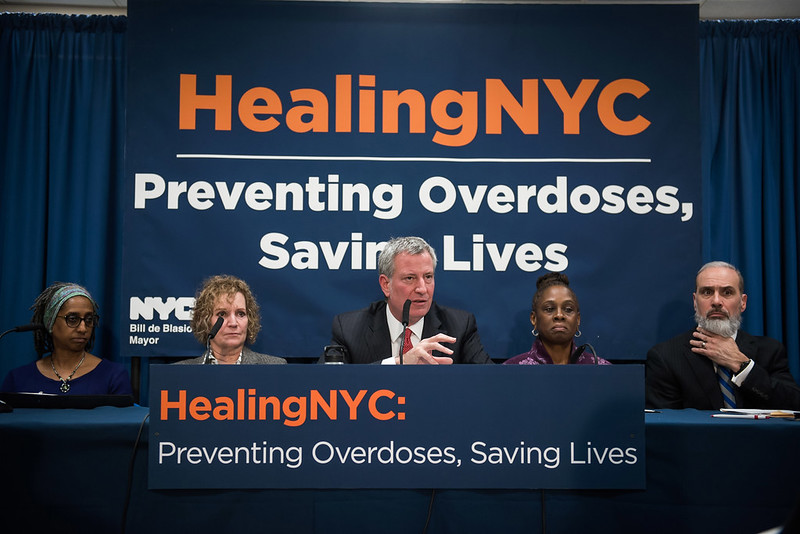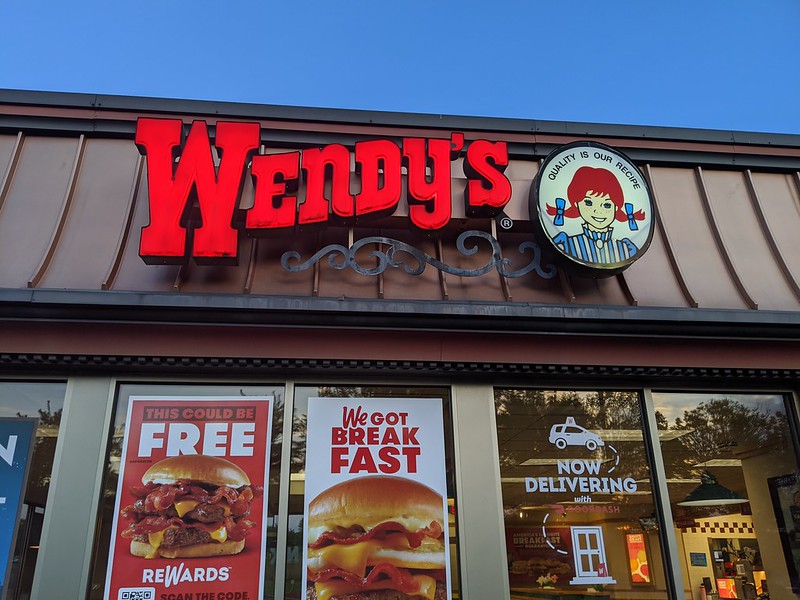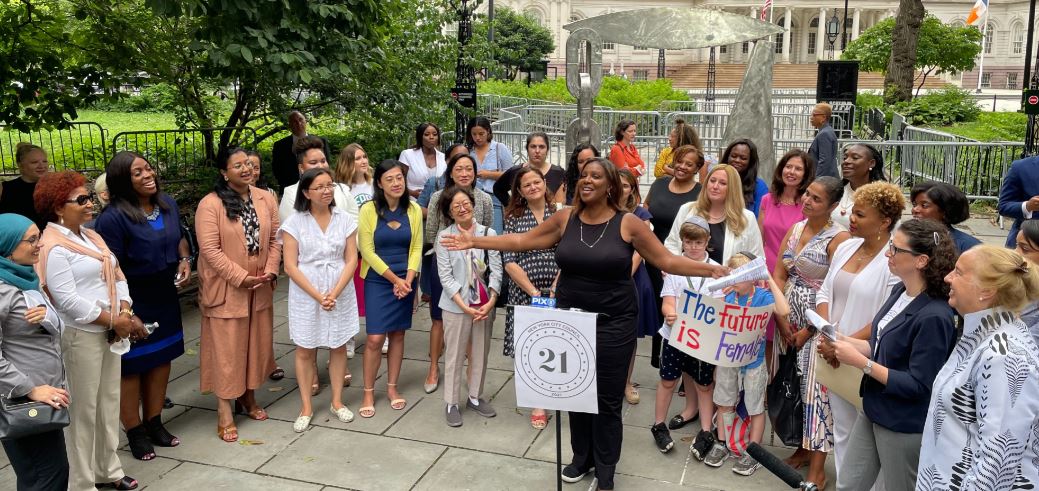Amid Rising Overdoses, Mental Health and Harm Reduction Support More Important Than Ever

The Mayor at an overdose prevention event (photo: Ed Reed/Mayor's Office)
I know what it’s like to be on the front lines of an infectious disease. I launched my career in harm reduction in the 1980s, at the height of the HIV epidemic. Just like with HIV, the fallout from COVID-19 is not limited to the lives we’ve lost to the infection itself—there are ripple effects that will be felt long after our city fully re-opens.
This time, it’s the twin tragedy of the dramatic rise in overdose deaths amid the pandemic due to the anxiety and isolation of life during lockdown. Despite years of efforts across our nation to address the opioid crisis, the pandemic illustrates how tenuous progress can be: overdose deaths increased by nearly 30% nationwide and by 21% in New York City in 2020, with many fatalities attributed to the synthetic opioid fentanyl.
To address this dire trend, we’ll need investments and partnerships between the government and nonprofit organizations on the ground to provide mental health and substance use disorder services. In the months and years ahead, people will need compassion and accessible care.
I currently work as a harm reduction counselor at Alliance for Positive Change, a nonprofit that supports New Yorkers with HIV/AIDS and other chronic health conditions, like substance use disorder. New Yorkers come to Alliance LES Harm Reduction Center for syringe exchange, medication-assisted treatment, and substance use disorder counseling.
When the pandemic struck our city, organizations like ours had to adapt quickly by shifting some of our programs to a virtual setting. For example, we’ve held our Narcan trainings weekly over Zoom, teaching hundreds of program participants, providers, and community members how to administer the drug to reverse opioid overdoses.
We have continued to offer our other services by appointment, but in this work, nothing is more important than our in-person community and open-door atmosphere—which is why we are so grateful that we can begin to return to regular operations. The lack of connection has been difficult for the people who rely on us, like “John,” a young man who had been attending support groups regularly, but who now expresses concern about setbacks on his recovery journey. It offers him some reassurance that no matter what, we will be there for him.
As hope begins to glimmer on the horizon and life starts to feel more “normal,” we cannot lose sight of the fact that the mental health impacts of the pandemic will linger. I’m glad to see that New York City is recognizing the great need for mental health support that lies ahead, and I hope the next mayoral administration will continue these efforts in 2022 and beyond.
In the short-term, investments in harm reduction interventions like Narcan and drug testing strips will help to reduce the risk of overdose deaths. In the long-term, the city should partner with deep-rooted, trusted community-based organizations who are doing important mental health work. Expanding mental health and harm reduction services to those who do not have access to as many resources will be critical to addressing this devastating trend. At Alliance, we connect with and serve some of the most vulnerable New Yorkers, and services like ours are needed more than ever.
***
Floyd Mitchell is a harm reduction counselor at Alliance for Positive Change’s LES Harm Reduction Center.
***
Have an op-ed idea or submission for Gotham Gazette? Email This email address is being protected from spambots. You need JavaScript enabled to view it.
New York City Should Send a Message to Wendy’s, Which Refuses to Protect Its Farmworkers

Wendy's (photo: @jjbers)
When the country’s largest fast food companies were pressured to step up to combat sexual violence, forced labor, and other human rights abuses in their supply chain, they all eventually agreed — except one.
After years of pressure, Wendy’s still refuses to follow its peers and join the Fair Food Program to protect farmworkers and uphold their human rights. But the movement to get Wendy’s to take this basic step is gaining momentum. It’s time for the New York City Council to pass a resolution introduced over a year ago calling on Wendy's to join the program as a necessary support for farmworkers' lives.
The City Council resolution is part of a campaign that has included years of organizing and work by people across New York and around the country — farmworkers, consumers, activists, students, religious leaders — standing against the power imbalance between major corporations and farmworkers and the abuses that can result. The campaign has included a consumer boycott, and protests including a five-day hunger strike and march in Manhattan.
Even investors are getting on board: in April, a group representing $1 trillion in assets under management, including the Office of the New York City Comptroller, released a letter amplifying the campaign's demands and drawing attention to the widely-publicized failures to protect worker safety throughout Wendy’s supply chain. Convened by the Interfaith Center on Corporate Responsibility, these investors emphasized the dire conditions farmworkers have faced nationwide during the global pandemic, and the Fair Food Program’s unique binding and enforceable COVID-19 safety protocols on farms within the Program, directly challenging the disproportionate impact of the pandemic on Brown and Black essential workers.
Activists and investors alike can see that the conditions faced by agricultural workers do not reflect our values. Many workers face poverty, sexual harassment, and forced labor. Around the time the resolution was introduced to the City Council, the Council’s Women's Caucus outlined its support, calling particular attention to the ways that farmworkers face gender-based violence. Caucus members described how sexual violence “has been a scourge in U.S. agriculture for decades with a staggering 80 percent of women farmworkers reporting having experienced sexual harassment and assault on the job.”
Both the investors’ and the Women’s Caucus letters are addressed to Nelson Peltz, who is both the Wendy’s Board Chairman and Chairman of Trian Partners, a hedge fund that is Wendy’s largest institutional shareholder and is based in New York City. A resolution from the City Council is essential in order to send a strong, united message to the corporate entity that holds the key to enacting this necessary change.
These conditions have also attracted the attention of religious leaders, including rabbis from T’ruah, a rabbinic human rights organization from which I draw moral strength, and whose members have marched alongside workers as they demand fair conditions. New York religious leaders representing a cross section of faiths have also come out in support of the resolution. Many faith traditions, including my Jewish faith tradition, call on us to seek justice and fight for human rights for all. In a letter published shortly after this resolution was introduced, New York’s religious leaders said it plainly: “Farmworkers deserve work with dignity.”
The Fair Food Program delivers that dignity. The Program was created a decade ago by the Coalition of Immokalee Workers, a worker-based human rights organization. The program brings together farmworkers, consumers, major food retailers and growers to create a 21st Century agricultural industry that no longer tolerates inhumane conditions and low wages for agriculture workers. Participating growers meet strict standards developed by farmworkers themselves — including the right to work free from sexual assault and harassment, safe working conditions including shade, water, and clean bathrooms in the fields, worker-to-worker education, the ability to report violations of their rights without retaliation, access to breaks, and safe transportation to work.
The standards are upheld by an independent monitor that conducts regular audits and manages complaint investigation and resolution, ensuring growers are following the rules. If the monitor finds violations, growers risk being expelled from the program. In turn, participating buyers – large food retailers including Wendy’s main competitors, such as McDonald’s and Burger King – sign legally binding Fair Food Agreements that commit them to buying from certified growers. Each group benefits. Workers receive protection and fairer wages, growers get a stable workforce and distinguish their products from competitors, and retailers prevent abuses in their supply chain and uphold their stated corporate social responsibility values.
These ideas don’t just look good on paper, they get results. Since the Fair Food Program launched in 2011, farmworkers have received more than $36 million in pay bonuses thanks to the Fair Food Premium paid by Participating Buyers. Close to 75,000 farmworkers have been educated on their rights, and over 300,000 workers have received “Know Your Rights” education booklets. Additionally, the independent monitor has recovered over $400,000 for workers in funds they were owed. More than 9,000 audit findings have been addressed by corrective action measures. Most fundamentally, workers now are protected when they call out injustices they face in the fields.
Already, major food companies such as McDonald’s, Subway, Burger King, Chipotle, Walmart, Trader Joe’s, Whole Foods, and Yum! Brands (the parent company of KFC, Taco Bell, and Pizza Hut) participate in the program. Wendy’s absence on this list is notable – and unacceptable.
Wendy’s wants the smiling face on its logo to convey friendliness and quality. Those who know better understand that behind that smile is a corporate structure that stands alone among its peers in rejecting common sense protections for workers in its supply chain. It is time for Wendy’s to do its part to protect the vulnerable and working class, and the New York City Council should act swiftly to send a message to Wendy’s about how much New York values human dignity and worth.
***
Ruth Messinger, former Manhattan borough president, is global ambassador for American Jewish World Service and the social justice activist-in-residence at the Marlene Meyerson JCC Manhattan.
***
Have an op-ed idea or submission for Gotham Gazette? Email This email address is being protected from spambots. You need JavaScript enabled to view it.
When Women Run…

Letitia James, the author, celebrating the likely women's Council majority (photo: @21in21NYC)
New York’s biggest strength – by far – is its diversity. New Yorkers speak more than 700 languages, represent hundreds of countries, and span every level of socio-economic status. We’re every color, every religion, and every identity. Our communities thrive when we lean into our diverse cultures, ensuring voices from all corners of our city are heard and represented. Unfortunately, our City Council has historically failed to achieve that.
For a city with a population that is more than 50% women, there is no excuse for not having that same proportion represented in local government. Inclusive leadership leads to inclusive policies, and the most diverse city in the world needs a government that reflects all that we are and represent.
We are finally poised to achieve that goal, with a majority of women well-positioned to take over the New York City Council for the first time in history. If elected in November, this new class of City Council members will take office in January and finally mirror the pluralism and diverse cultures of the city it will represent.
Over the past two decades, the number of women in the City Council decreased dramatically. Out of 51 Council seats, only five women were non-term-limited incumbents set to remain in office in 2022. Our city government was failing to reflect the heterogeneity of the five boroughs. Yet, when faced with higher stakes than ever before, New Yorkers responded resolutely, voting for women across the board.
This election reaffirms what we already knew: it is in everyone’s best interest to direct attention, assistance, and support to female candidates, and increase the representation of women in local government. The work of organizations like 21 in ’21, co-founded by former City Council Speaker Melissa Mark-Viverito and former City Council Member Elizabeth Crowley, is vital in this effort. As we now know, when given proper resources, these organizations, and the candidates they support, are overwhelmingly successful.
Now, after years of organizing and advocacy, our City Council will look more like New York.
We are set to see the first Muslim woman, the first South Asians, the first openly gay Black woman, the first Korean woman, and the first queer Jewish woman elected this November to the City Council. What’s more, we will see more Council members who are mothers than in years past, and a historic increase in the number of Latino/Afro-Latino, Black, and Asian City Council members. More historically oppressed individuals and communities are claiming their seats at the decision-making table, and New York is all the better for it.
We are watching transformative change in action. This past year shined a new light on the deep-rooted injustices in our city, state, and nation, and the experiences of these new, diverse Council members will provide us with fresh perspectives that will help us tackle the most pressing issues. From COVID-19 to safer streets to small business recovery, creating a stronger and more sustainable economy, and more, every issue is a woman’s issue, and deserves a woman’s focus.
As I witness this historic shift, I am filled with admiration and respect for those who saw the problems of the city and have dedicated themselves to fixing them through public service. As a former City Council member, the first female Attorney General of New York, and the first Black woman elected statewide here, I am intimately familiar with the hurdles that these women have overcome and will continue to face throughout their careers.
Win or lose, running for office is an incredible feat, and I encourage all of those who were not victorious this time to keep trying. Although we have yet to elect a woman mayor, it is an achievement in-and-of-itself that two of the three leading candidates in the Democratic mayoral primary were women. It’s the first time that’s happened for New York City, but it certainly won’t be the last.
Our City Council may soon reflect the diversity and multiculturalism of New York City, but our fight is not yet finished. Let this be a stepping-stone on which we base our future efforts for representation and justice for all.
This year, New Yorkers reaffirmed their support for strong and diverse female candidates. The slogans we’ve chanted for years are finally becoming our reality. When women run, women do win, and so do all of our communities.
***
Letitia James is the Attorney General of New York. On Twitter @TishJames.
***
Have an op-ed idea or submission for Gotham Gazette? Email This email address is being protected from spambots. You need JavaScript enabled to view it.




